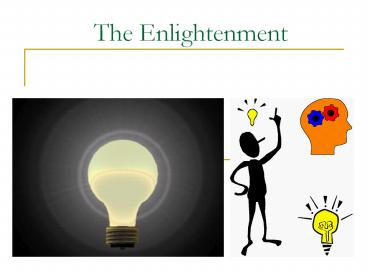The Enlightenment - PowerPoint PPT Presentation
1 / 21
Title: The Enlightenment
1
The Enlightenment
2
2 Questions
- 1) Is man good or is man evil? Explain, give
examples - Do not say both
- 2) Attempt to explain this quote
- Man is born free but everywhere else he is in
chains
3
Enlightenment
- just after Scientific Revolution
- People begin to reevaluate aspects of society
- Economics
- Religion
- Education
- Government
4
Enlightenment Definition
- Enlightenment (mid 1700s) - an intellectual
movement that stressed reason and thought and the
power of individuals to solve problems. - Also known as Age of Reason
5
Two Views on Government
- Thomas Hobbes- Leviathan 1651
- John Locke- Two Treatises on Government
Hobbes
Locke
6
Hobbes
- Believed all humans were naturally selfish and
wicked - Had witnessed this during English Civil War
- Without government, man would be in consistent
war with one another leading to solitary, poor,
short lives
7
Hobbes
- In order to escape this, people must enter into
a SOCIAL CONTRACT with a ruler in exchange for
law and order. - This would allow people not to act on own self
interest and give ruler total power. - In your own words, what does this mean?
8
John Locke- Natural Rights
- Believed people could learn from experience and
were reasonable - Believed people were naturally good and could
govern themselves - Against an absolute monarchy
- Believed in NATURAL RIGHTS
- Life, Liberty, and Property
- Where have you seen this before?
9
Locke
- Believed a governments purpose is to protect
these rights and if a government does not, the
people have the right to overthrow it - Rule by popular consent
Basically if a government does not do what you
want it to do, you have the right to get rid of
it.
10
Other Enlightenment Philosophers
- Voltaire consistently fought for tolerance and
freedoms through essays, books, and philosophy - I may not agree with a word you say, but I will
defend to the death your right to say it.
11
Other Philosophers
- Montesquieu Separation of Powers
12
Montesquieu
- 3 branches of government
- Separation of powers
- Checks and balances
13
Montesquieu Continued..
- French writer whom believed England had best
government because power was spread among King
and ParliamentProposed that the best way to keep
a government from becoming too powerful was to
make sure each side never had enoughNeed each
other- Checks and Balances
14
Other Philosophers
- Rousseau he believed the best government was
that formed by free people. - direct democracy
- People give up freedoms for common good
- Man is born free, everywhere he is in chains
15
A change for Women
- Prior belief Education for women was to help
them be helpful wives and mothers - Men dominated marriage
- Mary Wollstonecraft
- Used reason to make point that women should be
equal - Education will help them become equal
- Criticized equality of marriage
- If all men are born free, then are all women born
slaves?
16
So what is so important about the Enlightenment?
17
So what is so important about the Enlightenment?
- Created a greater reliance on logic and reason to
solve problems as opposed to traditional views - People began to not only question government, but
religion more freely - Rise of individualism- people began to use own
reason to determine right and wrong. - Also our role in society
- Governmental ideas influenced new nations and
current nations to reconsider government that
ruled them
18
Enlightened Despots
- Monarchs who tried to use Enlightenment ideas
- Still wanted absolute power but tried to please
the people
19
Fredrick the Great
- King of Prussia
- Religious freedom
- Reduced censorship
- Reformed justice system
20
Catherine the Great
- Czarina of Russia
- Land reform
- Improved education
- Expanded the empire
- Many of her ideas never actually happened
21
Joseph II of Austria
- Son of Maria Theresa
- Ended Serfdom
- Ended censorship
- Fixed taxes































